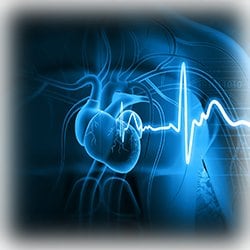10 Warning Signs for Atrial Fibrillation
Recognizing these signs of AFib and stroke can potentially save your life.
 Atrial fibrillation, or AFib, is the most common type of arrhythmia (irregular or abnormal heartbeat) in adults, causing the heart to beat too quickly. During AFib, an abnormal firing of electrical impulses within the heart causes the top chambers of the heart, called the atria, to quiver or fibrillate (beat very fast).
Atrial fibrillation, or AFib, is the most common type of arrhythmia (irregular or abnormal heartbeat) in adults, causing the heart to beat too quickly. During AFib, an abnormal firing of electrical impulses within the heart causes the top chambers of the heart, called the atria, to quiver or fibrillate (beat very fast).
Having AFib increases your risk of having a stroke. In fact, the risk of stroke in people with AFib is about five times higher than in people who don’t have AFib. That’s why it’s important to know if you have this serious heart condition so it can be treated.
“Some people who have AFib have no symptoms and don’t even know they have the condition,” says Ravi Sureddi MD, PIH Health cardiologist. "Others may experience symptoms but may not recognize that they are associated with AFib as symptoms may occur only occasionally.” Cardiac tests to determine if AFib is present include an electrocardiogram, echocardiogram, stress test or holter monitor.
Warning Signs of AFib
“Many symptoms of AFib may be similar to other heart-related issues, including a heart attack,” says Dr. Sureddi. “If you suspect that you are having a heart attack, especially if you have chest pain or pressure, call 911. Otherwise, if you have symptoms of AFib, let your doctor know.”
Warning signs include:
- Palpitations – the heart may feel like it’s racing, fluttering, pounding, thumping or beating irregularly
- Chest pain, pressure or discomfort
- Dizziness, light-headedness or faintness
- Shortness of breath
- Fatigue or lack of energy (in general or while exercising)
- Weakness
- Sweating
- Anxiety
- Confusion
Warning Signs of Stroke
Since AFib increases your chance of having a stroke, it’s important to recognize the warning signs of stroke if you have AFib. Time is of the essence if a stroke occurs, and the faster you get to the hospital, the better the chance that doctors can provide treatment that may improve your recovery and could even save your life.
Stroke warning signs typically appear suddenly, are more apparent on only one side of the body and may include:
- Face weakness: one side of the face may droop or become numb
- Arm or leg weakness: one arm or leg may be weak or numb; arm may drift downward if raised; it may be difficult to walk
- Speech difficulty: speech may be slurred or hard to understand; the person may not be able to speak or repeat simple sentences; it may be difficult to understand other people’s speech
- Confusion
- Dizziness, loss of balance or lack of coordination
- Difficulty seeing out of one or both eyes
What to Do If You Have Symptoms of AFib?
If you suspect you may have AFib, or have any symptoms of the condition, talk to your doctor.
“Treatments are available, including medications and options such as cardioversion therapy - a procedure to reset an abnormal heart rhythm to a normal rhythm - for temporary relief and minimally invasive ablation procedures for long term relief” says Dr. Sureddi. “The goal of treatment is to control the heart rate, maintain a normal heart rhythm and prevent blood clots from forming in the heart that may lead to a stroke.”
However, because symptoms of AFib can often overlap with those of a heart attack or stroke (both of which require time-sensitive treatment), call 911 immediately to get to a hospital as soon as possible if you are concerned that AFib may be occurring along with a heart attack or stroke.
Copyright 2022 © Baldwin Publishing, Inc. All rights reserved. Health eCooking® is a registered trademark of Baldwin Publishing, Inc. Cook eKitchen™ is a designated trademark of Baldwin Publishing, Inc. Any duplication or distribution of the information contained herein without the express approval of Baldwin Publishing, Inc. is strictly prohibited.